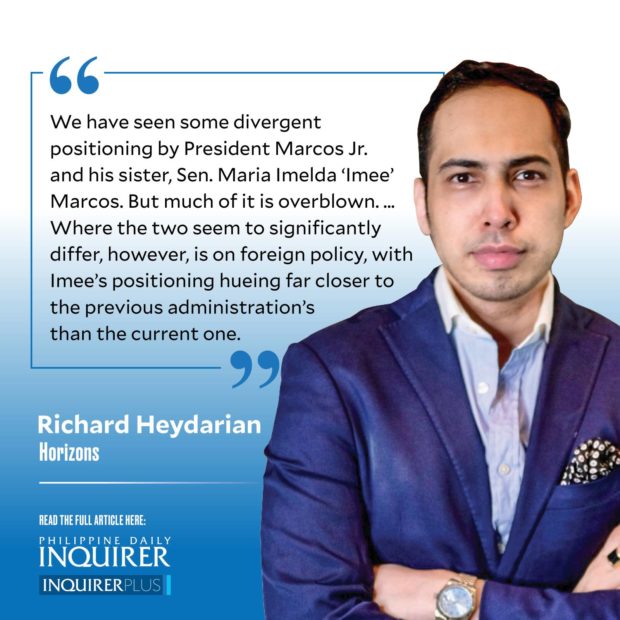Marcoses: Sibling rivalry?

In fact, the Philippines does worse than comparable nations, namely Thailand (42 percent) as well as those in Latin America, the world’s most unequal region: In Mexico, which used to be the de facto ruler of the Philippines during the Galleon Trade era, political dynasties, at their peak, controlled 40 percent of the legislature, while in Argentina, which has lived under the shadow of Juan Perón and the Kirchner family, the number is 10 percent.
In short, the Philippines is in a league of its own when it comes to oligarchic politics, so much so that one wonders if this country were ever a democracy at all. With our superlatively oligarchic politics comes also an element of anarchy, most dramatically in the shape of family feuds. Lest we forget, Sara Duterte, the current vice president, was a top contender for the highest office until the third quarter of 2021. Absent clear and consistent support from the incumbent back then, however, she wasn’t able to mobilize the necessary machinery.
Article continues after this advertisement“I was left with two letters endorsed to me by the President for consideration—one note explained why I should endorse the Go-Duterte tandem and the other suggested that I take in Senator Go as my vice president,” complained Sara in a statement in late August. “I respectfully advise them to stop talking about me and make me the reason for them running or not running,” she added, stating there was a meeting regarding the matter that was “not a pleasant event.”
A year later, media outlets have been speculating about another potential “family feud.” We have seen some divergent positioning by President Marcos Jr. and his sister, Sen. Maria Imelda “Imee” Marcos. But much of it is overblown. When it comes to the ratification of the Regional Comprehensive Economic Partnership agreement, for instance, the two siblings actually shared broadly similar apprehensions. This is the reason why the Philippines was the last party, aside from post-coup Myanmar, to ratify the megatrade deal, precisely because the President, just like his sister, had serious reservations about the impact of further trade liberalization on vulnerable sectors, most especially farmers.
Moreover, way before Mr. Marcos extended an olive branch and called for “unity” and “reconciliation” during the Edsa people power commemoration, it was Imee who provided a semblance of “apology” for her father’s authoritarian regime. “I said on many, many occasions that for those who were inadvertently pained, certainly, we apologize,” she said in a forum back in 2018, though refusing to offer a full apology.
Article continues after this advertisementOn many other occasions, Imee, as a senator, was simply doing her job, namely scrutinizing key government decisions. Where the two seem to significantly differ, however, is on foreign policy, with Imee’s positioning hewing far closer to the previous administration’s than the current one. This explains, inter alia, her staunchly nonaligned “seven-point agenda” speech in Washington last year, as well as her spirited opposition to the Enhanced Defense Cooperation Agreement expansion deal and to ongoing plans to conduct large scale military drills near Taiwan’s shores.
Ultimately, however, this all could also boil down to the presidential sister’s own ambitions and her efforts, as clearly demonstrated in a series of movies meant to shape the national discourse in her own image. After all, Ferdinand Marcos Sr. was supremely proud of his daughter, who excelled in school and showed political talents early on; the late strongman fondly cited, in one of his diaries, the Ilocano expression, “An apple tree will not bear orange fruit,” though, cognizant of prevailing patriarchy, lamented: “I wish she had been a boy.”
More than half a century later, Imee is likely looking forward to the senate race in 2025. And should she top that race, which seems highly probable based on preliminary surveys and trend lines, her next step will likely surprise few observers.















